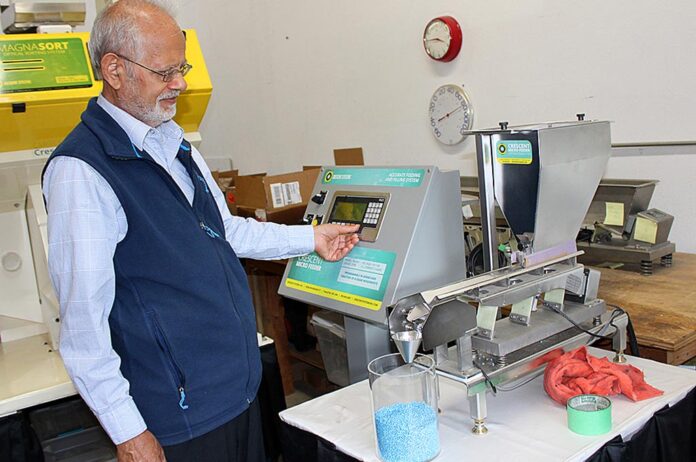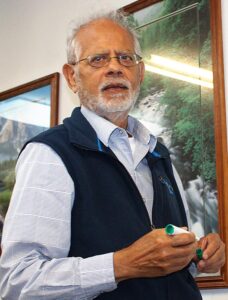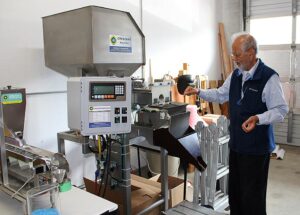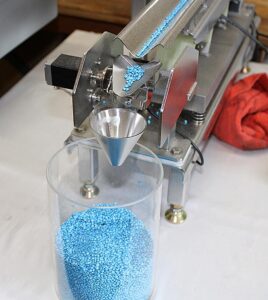
Deep in a Tualatin industrial park is a business called Crescent Systems, and passersby likely have no idea that the company has had a hand in creating the packaging processes for the potato chips and nuts they purchase. Furthermore, owner Gulzar Ahmed, an immigrant from Pakistan, is truly an American success story, arriving nearly broke in the U.S. courtesy of a charitable organization, meeting and marrying his American-born wife Shafqat, raising two sons who are both successful in the financial sector, and building a business that has filled a niche in the food-processing and packaging industries. His customers include Frito Lay, Blue Diamond Almonds, Diamond Foods, Mission Foods, Quaker Oats, Bob’s Red Mill and Ocean Spray.

Born and raised in Pakistan, Ahmed graduated from the University of Agriculture in Faisalabad, Pakistan, which had an exchange program with the Washington State University system. One of his professors was from WSU and encouraged him to go there.
“I had no resources, but I got a graduate teaching assistant job there,” said Ahmed, who named his future company after the Crescent philanthropic organization that paid for his plane ticket from Pakistan to Washington. “I had $30 in my pocket when I got here,” he said.
While teaching at WSU-Pullman, Ahmed earned his master’s degree in food processing systems and met his wife on her first day on the campus. Shafqat grew up both in Washington and Ohio and was a student at WSU when they met.
In 1972 he moved to Newberg for a job with Allen Machinery making food-processing machines, and the couple married in 1973. “At my first job, I used a drafting board instead of a computer,” Ahmed said. “My boss didn’t like using computers, but today we can’t work without them. I was young and wanted to do new things, and my boss was old-school. We eventually went from one computer to several.”
Ahmed worked in Newberg until 1978, spent a year in Seattle working for a consulting firm and then returned to work with Allen Machinery again before starting his own business in 1994.
Crescent Systems Inc. is a consulting, engineering and manufacturing company that specializes in products and services designed for use in the food-processing and packaging industries, and in 1996 it moved into its current location on Mohave Court.

Ahmed was working with vibrating conveyor systems while trying to figure out with his former boss a way to move maraschino cherries and other products on a conveyor without damaging them. At Crescent, he designed vibratory conveyors and got several patents involving weighing products on vibratory conveyors. Today Crescent employs only five people, including Ahmed’s wife.
“There is an annual food-processing show in Portland every year, and at one of them around 2011 I met Mr. Bob Moore of Bob’s Red Mill,” Ahmed said. “Bob came over and asked, ‘What do you do?’” I told him, and he came to my plant. He said, ‘I want to work with you. I want to work with a local company.’ They had been doing everything manually. Bob bought a big system from us that mixes seven different ingredients to make Muesli. They were very happy and went on to purchase other systems from us.”
As for the process, “we design it here, and we work with manufacturing facilities in Eugene, Salem and Tualatin to build the systems,” Ahmed said. “It’s nice to have working partners. We bring some equipment here to test, but the large systems go straight from the fabricators to the customers.”
Ahmed is also a problem-solver. Frito Lay was having a problem with its Munchos not being fed into the fryer correctly, so they were frying unevenly, and he came up with a system to do it by weight instead of volume. The result was a very uniform product and enhanced quality.
Ahmed has been active in interfaith organizations, including the Ecumenical Ministries of Oregon and the Muslim Educational Trust in Tigard, and he along with others started the Interfaith Council of Greater Portland. “We work to promote understanding among the different faiths,” Ahmed said of working with Christian, Jewish, Muslim, Buddhist, Baha’i and other faiths.

A major focus of his life is his family. The Ahmeds moved into their house in Tualatin in 1981, and their two sons attended Tualatin elementary and middle schools and graduated from Tualatin High School. One son and his wife live in the Bay Area and are hoping to move here, while the other son and his wife live in Tualatin and have a 7 1/2-year-old daughter.
The Ahmeds have traveled to Pakistan many times, and both of their sons got married there. Ahmed’s parents came to the U.S. in 1984 and lived with them until 2003, when on a trip to Pakistan, his dad died. Ahmed’s mom moved to Scottsdale, Ariz., to stay with his two brothers and passed away in 2019.
“The credit goes to my wife,” Ahmed said. “She learned to speak some Urdu, the native language of Pakistan, and was able to communicate with my parents, and my mom taught her family recipes.”
Longtime Tualatin resident Larry McClure is a neighbor of the Ahmeds and recalled when Ahmed’s father would walk by his house in his traditional garb.
“I was growing my garden in the front and back yard, always with hot chili peppers that Pakistanis love,” McClure said. “We didn’t understand a word each other spoke, but there was a lot of laughing, pointing and just enjoying each other. Soon he was growing peppers there too, using plants I’d started.”




















